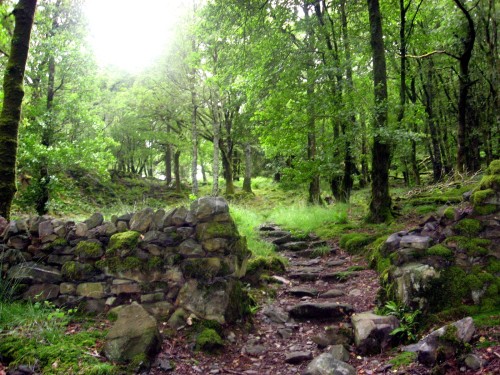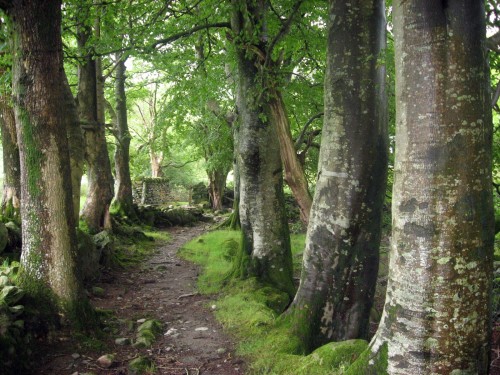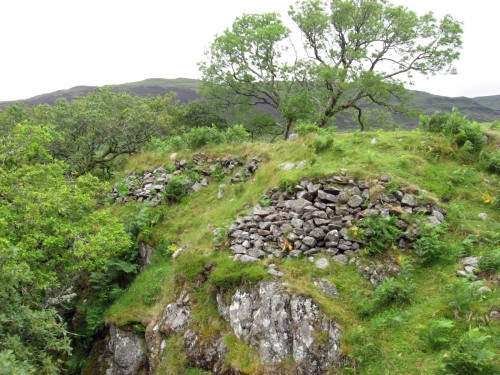(Note: I wrote this essay a couple years ago for English 101. See this post for background info. All photos are from our trip and taken by me.)
She followed me all over that island.
From the moment we stepped off the plane, I went and she followed. When we arrived at Euston Station and stood before the map of Technicolor spaghetti that’s the London Underground, I pointed and she followed. From Manchester to Ilford, from Beddgelert to Edinburgh, I got the directions, copied the confirmation numbers, reserved the rooms and read the maps.
Maybe she couldn’t do it herself. Maybe she didn’t want to. But for the first time in our lives, she was completely willing to let me take the lead, and with that sort of trust, how could I refuse? With every step I heard her voice just behind me, the fall of her feet and the straps of her backpack clinking. So it’s strange to me, looking back on a friendship three years dead, that it was on that trip I started to lose her.
No two people can be exactly alike, much as they’d like to think they are. Even in our childhood it was evident Emma and I didn’t share certain interests. A love of art, language, music and beauty: the obvious things were the things we bonded over. Things you can feel with your hands and hear with your ears. We painted together, watched movies and made clothing, played guitar and obsessed about the Beatles, all at shared levels of enthusiasm. But when I wondered out loud what the songs were about, or what the artists were feeling when they applied paint to the canvases we both loved so much, she would laugh and ask why I bothered with those kinds of things. As much as I tried, I couldn’t give her an answer. I just did. I saw things that were not there, thought about things that didn’t exist–not anywhere outside my own head.
However, that was beginning to change. With a lot of work and a little bit of magic, I was learning to make them exist, for real, in the world we both inhabited. That’s what I was trying to do with my story about Dinas Emrys.
As we were planning our month-long tour of the UK, I made one thing clear: I wanted to go to Wales. Not just any part of Wales. Snowdonia, specifically the village of Beddgelert. I wanted to climb Dinas Emrys and take pictures of the ruins while I was on the same continent. It was my only stipulation.
You can find it easily; a mere stone’s throw from the A498, you don’t even have to get out of your car to get a picture of it. A rocky hilltop with a shaggy pelt of bushes and scrub running along its back, Dinas Emrys embodied everything I was struggling to express with my writing: rich history, hidden treasure, a tapestry of folklore and actual ruins you could visit, touch, feel and experience. Here at last was a physical link between the world of my imagination and the world everyone else inhabited. There was no way we could pass up an opportunity to visit.
Honestly, I shouldn’t be surprised with the way it turned out. Hiking for miles up to your knees in mud, following a meandering course up an obscure hilltop it’s technically illegal to climb, all to take some pictures of a pile of rocks isn’t high on many people’s list of things to do before they die. Maybe I was expecting too much out of her. Maybe I was just hoping for a little bit more.
“I’m gonna go back to the room and watch TV for a while,” she told me over scrambled eggs and oatmeal in the bed and breakfast dining room. A dark-haired family in the corner spoke softly in Welsh, their words sounding like a limerick over the tinkling of forks and spoons.
“But. . . I thought we were going to Dinas Emrys today.”
She tossed her hair over her shoulder. “Again? We went yesterday.”
“We just went by and took pictures. Today I want to climb to the top.”
I have lovely pictures of us that day: her standing by a stone shed almost completely covered in moss and lichen; her in front of the lake; another one of her in front of the lake; and the obligatory me as a speck in a field, with my mountain as the backdrop. That entire trip, the only pictures of me are the ones I coaxed her to hold my camera and take. If she didn’t come, who would take my picture at the top?
“You can go,” she said, her voice taking a sharp turn up. “But I wanna stay in the room this morning.”
Our room had been a deal, but that’s the extent of its praise. We slept in the attic, with the only view of the windswept countryside being straight up, through the skylight.
“Emma, this is why we came to Wales. I have to climb that mountain.”
“Then climb it.”
“I don’t wanna go by myself.”
I should have mentioned the movie premier in London I endured for her, the press of people twenty-deep against my back, a man dressed as a pirate nearly knocking me down when the stars passed within autograph reach. My camera held those pictures too, and she’d looked at them every day since.
I should have mentioned it, but all I could think about was being alone, for the first time, in the wilderness of a country that wasn’t mine.
“Please, Emma. Come with me.”
“I told you, I don’t want to go. It’s going to rain and I’m tired and we went out yesterday. My shoes are still wet and I have a blister. We’ve been travelling for weeks and all I wanna do is lie around and watch TV and do nothing!”
The family in the corner stopped talking. I looked down at my eggs, half finished and cold on my plate.
I climbed it, of course. This wouldn’t be much of a story if I didn’t. The pictures are a swirl of green moss, black earth and grey sky. I sat on the ruins of the 11th-century keep and thought about characters that would never come to life, a story that would die in my mind. I wiped the rain from my lens and started down the mountain, imagining–as always–I heard the footsteps that did not follow.







